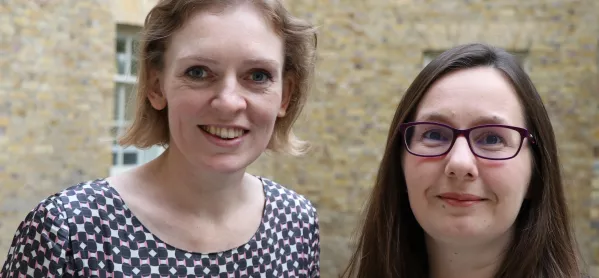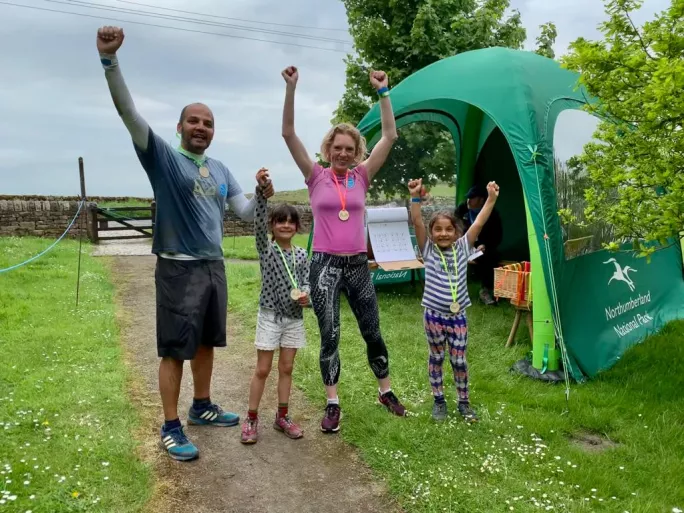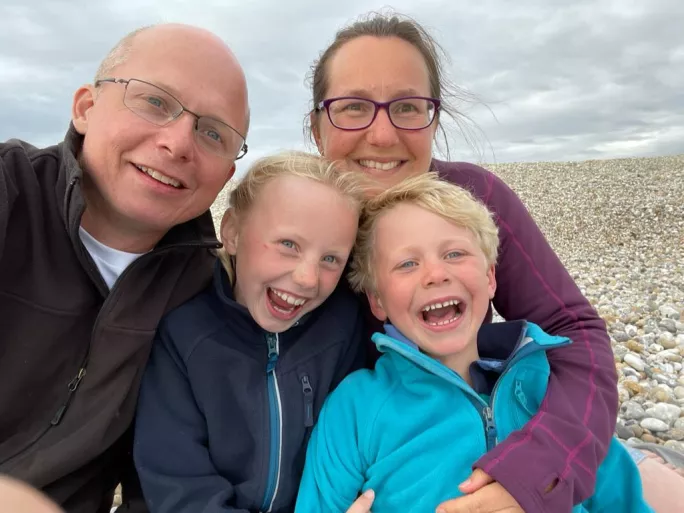Meet the women leading the green skills revolution

“Because we’re both from the North East and we’ve grown up in a region that often feels quite far away from Whitehall, it’s brought an outsider perspective to our work and a real awareness of levelling up,” says Beth Chaudhary.
“I don’t think our partnership is a coincidence - there’s something about our perspective that’s a bit different and which bonds us.”
For five years now, Chaudhary has jobshared with Rachel Cooper in roles across government, including in the Cabinet Office and the Department for Business, Energy and Industrial Strategy.
Their pairing is a tried-and-tested success, and in May this year they moved across to the Institute for Apprenticeships and Technical Education as strategy directors. There, they will help the Institute deliver on goals around green apprenticeships, higher technical qualifications and responsibilities in the new Skills and Post-16 Education Bill. It’s a big remit - but one that, they say, they are excited about and ready for.
“When we saw the job advert, we both emailed each other straightaway and said, ‘Have you seen this? Imagine if we got the chance to be involved in it’,” says Cooper. “It’s moments like that which are a sign.”
“We do feel empowered at the institute by Jennifer [Coupland],” says Chaudhary. “It wasn’t just an interview pitch - it’s actually, ‘right, OK, what are we going to do, then? Let’s get practical, let’s roll our sleeves up’. It’s really, really exciting.”
Opinion: Colleges need employers’ help in the skills revolution
Tes magazine: Apprentices can energise the green revolution
Need to know: The Skills and Post-16 Education Bill
Parallel beginnings
Cooper was born in Newcastle; her father was an engineer and her mother a teacher. She says she’s “a bit of a geek” and loved school, having gone to a state primary and then private secondary. As a child, she loved everything: maths, sciences, sport, drama - and was also in the cadet force. After completing her GCSEs and A levels, she applied to the University of Cambridge to study geology.
Chaudhary grew up an hour down the road, in Northumberland. She’s the daughter of two doctors - and while her sister followed in their footsteps and became a doctor, too, Chaudhary loved languages, and thrived in French and English lessons. She too went to study at the University of Cambridge, but chose English, and their paths didn’t cross.
While Cooper stayed on to get a PhD at the university, Chaudhary went to work as a teaching assistant in the Pyrenees before moving to the Alps to be a holiday rep.
Both entered the Civil Service through the Fast Stream; while Cooper worked in the Department of Energy and Climate Change, Chaudhary went to the Department for Environment, Food and Rural Affairs.
Their paths first crossed in 2009 when they worked in the fuel poverty review team, looking at how fuel policy affected people who struggled to pay their bills or lived in poor-quality housing. It’s a piece of policy they are both really proud of: Cooper for the work she did in using data to give people direct discounts on their bill if they met certain characteristics, and Chaudhary for her work with energy suppliers to deliver heating and insulation to low-income vulnerable households.
“That’s the privilege of being in government. You have steers and ideas from ministers, and then our job is to practically work out what it will take to change it, what legislation you need, which companies you need to talk to, how are we actually going to do this in practice,” says Cooper.
“That’s been part of the draw of coming to work for the Institute - getting to go back into that sort of environment working much more closely with businesses, colleges, a whole range of people. We learned a lot working in the centre of government, but it feels like this is where change is at, at this juncture point.”

A passionate partnership
A few years passed by. Both Cooper and Chaudhary went on maternity leave and had different roles in the Civil Service. But when Chaudhary was working in the Smart Energy Strategy team, the opportunity arose for them to jobshare, and they went for it.
“For years, we’d said, ‘this could be great, this could be a brilliant jobshare’,” remembers Chaudhary. Jobshares were not unusual - today there are about 1,000 of them in the Civil Service - but it was when the pair moved across to the role of principal private secretary for the chief executive of the Civil Service that they really pushed the boundaries.
“Our jobs in central government weren’t always the roles that people would have thought you could do as a senior jobshare. It was a bit of an experiment, a bit of a stretch for them to take us on to do it,” says Cooper.
“I think we did well, it worked well. We worked so hard to demonstrate that you can do it and that role modelling is something we take quite seriously and we’re conscious of, because it’s a brilliant option if you want to work in that way. It’s space for family, it’s space for other activities, it’s space to think and that’s while someone else is doing the job and that is a total privilege.”
So, what is it which makes the partnership work so well? Are there things that Cooper is better at than Chaudhary, and vice versa?
“We do have different strengths, although we don’t like to be pigeonholed by those strengths. A lazy person might say Rachel is the geologist, the scientist one who is good with spreadsheets, and Beth is the writer, the creative, big-vision woman. But neither of those things we would accept - we would say we’re actually both good at both of those things, and we’re also both really good at learning from each other, feeding back to each other,” says Chaudhary.
“The first person we are accountable to is each other. Each week, we say, ‘here’s the progress I’ve made on the things we’ve agreed are important, here’s the things I’m not sure about that I want to discuss with you because this feels big and it feels like a joint decision, here’s the stuff I’ve waved through because it’s straightforward’.”
They are in total agreement: their success is shared, no matter who does the work. So, Chaudhary says, are their challenges.
And during the past 18 months, a job in the Civil Service has been far from easy. Having someone who cares about your job as much as you do really helps to alleviate stress, says Cooper.
“We both try to preserve each other’s days when we’re not in the office because you’ve got to take the reins and work when you’re the one in, but those handover moments are brilliant. It is a source of resilience, you’ve got someone that cares about your job as much as you, that cares about the outcome, that cares about what you’re trying to change as much as you do,” she says.
The mission on green skills
It’s clear they both believe in, and really care about, the mission they face at IfATE.
“We really believe in accelerating green skills as part of the realm of technical education and apprenticeships, but also as a part of the big post-Brexit growth agenda to really kickstart the economy,” says Chaudhary.
“We really need to use the moment of COP [COP26, the UN Climate Change Conference that takes place in Glasgow later this year] to accelerate and change on green skills. On levelling up, we’re starting to look at how, through our national apprenticeships, we empower and enable local areas to collaborate between the colleges and the potential new emerging employers to make sure that we’ve got the right pipeline of skills.
“It just feels like vocational education is an incredible way of supporting people from deprived backgrounds or people with protected characteristics to set up brilliant careers for themselves and progress through those careers at all of the levels. It’s early days but we’re starting to look at how we make sure that’s happening and how we make sure that we’re really putting the right incentives in the system to use apprenticeships and technical education as an engine for levelling up in a social sense, as well as the regional and local sense.”
Cooper says they are aware of the challenges around apprenticeship starts, but is firm that the focus needs to be on quality apprenticeship, not quantity.
“There is a balance between looking at numbers, but also looking at quality. It is no good having vast numbers of people doing qualifications that actually aren’t going to take them anywhere. The system is wrong if that’s where we’ve ended up,” she says.
“On improving access to apprenticeships, there’s not going to be a kind of a single bullet or a single policy. It’s about making sure the system as a whole works, making it attractive, making those career propositions real, and that threads back to some of the work the Institute’s doing on occupational maps. It’s about giving people a sightline: ‘If I start here, if I go in on this level 2, where it could take me? Where could I go?’ That also fits with the work the DfE is doing on the National Careers Service.”

Listening to, and learning from, FE
Neither Cooper nor Chaudhary experienced the further education system in their own education - but they both say they are committed to listening to, and learning, from the sector.
Chaudhary virtually visited Hopwood Hall College, and said it gave her food for thought.
“It was really interesting to hear how they’re collaborating with local employers, but also hear about some of the barriers they’re finding in getting learners succeeding and passing their end-point assessments,” she says.
“It’s about listening, it’s about understanding people’s perspectives and some gentle challenge where we can, and that’s part of the joy of hearing this range of voices. We’d love to get on some visits and we have been doing them virtually, but the best way to properly get under the skin of what’s going on is to be there in person,” says Cooper.
Outside of the office, they both spend much time with their families - Cooper has a daughter and a son who are aged 6 and 8, and Chaudhary has two daughters, also 6 and 8.
And while their hobbies do differ - Cooper loves sport and being active and Chaudhary loves to sew and dreams of being on The Great British Sewing Bee - they both come together every Wednesday morning to hash out any issues and brainstorm new ideas. Sometimes they’ll go on a run; recently, they’ve been swimming in the Hampstead Heath ponds.
Who knows what changes for technical and vocational education will be strategised during those mornings, but one thing is certain: two heads are better for the sector than one.
You need a Tes subscription to read this article
Subscribe now to read this article and get other subscriber-only content:
- Unlimited access to all Tes magazine content
- Exclusive subscriber-only stories
- Award-winning email newsletters
Already a subscriber? Log in
You need a subscription to read this article
Subscribe now to read this article and get other subscriber-only content, including:
- Unlimited access to all Tes magazine content
- Exclusive subscriber-only stories
- Award-winning email newsletters